- Home
- Jim Fergus
The Vengeance of Mothers Page 29
The Vengeance of Mothers Read online
Page 29
“But I know nothing about waging war, Phemie.”
“You know how to shoot a rifle, and you are a fine horsewoman. That will have to suffice. Come to our meeting this afternoon after we make camp. I will send Pretty Nose to lead you there. Little Wolf is gathering the heads of all the warrior societies for a council, including the chiefs from the Lakota and Arapaho bands who are already here with us. Pretty Nose and I will be attending. It is, perhaps, the first time in the history of the tribe that women have been invited to participate in council. We will know more after the powwow. All I can tell you for certain now is that we are going to war, and sooner rather than later.”
“Did you know that Hawk and I are planning to adopt this little girl, Phemie?” I said, putting my arm around Mouse. “She lives presently with the old couple Bear and Good Feathers. She’s an orphan.”
“Yes, I knew her family. They were fine people.”
“And if I go to war, she risks losing me, as well.”
“Her parents died in the village that morning, defenseless, like so many others, Molly, because we were not prepared. But now we are no longer waiting passively for the Army to attack us. We are traveling to unite with the other bands of Arapaho and Lakota, and the chiefs are leading us to a strategic position from which we will attack them.”
“You know, Phemie, to wage war against our own government is not precisely what I and the other girls signed up for.”
“That is what our group believed. However, we learned the hard way … and too late … that, in fact, it was exactly what we had signed up for. Our government plans to exterminate us. And so this child is all the more reason for you to fight.”
Phemie reined her white stallion, who wheeled in a tight circle, snorted, whinnied, threw his head, and kicked both back feet out behind him, whether from sheer wild exuberance, or rebellion against being tamed and restrained, it was hard to say. Perhaps a combination of the two.
“Is that horse even broke, Phemie?” I asked.
“More or less,” she answered with a smile. “I’m working on it, but he’s the kind of horse that never gets fully broke. He’s got too much heart. He needs to run.” She touched her heels to his flanks, gave him his head, and off they dashed.
With her queenly bearing and sonorous voice, Phemie commands such natural authority that it is hard to say no to her. I decided it could not hurt to at least attend her meeting. In so doing, I was under no obligation to join. It is true that despite all we have heard from Meggie and Susie about the horror of their own experience, and from Phemie, and all that Gertie has told us, our own group has nevertheless held tight to the illusion that somehow an attack upon our band could be avoided, that the specter of war was only that—a phantom, a bogeyman—one that would never actually come to pass … not to us, surely … perhaps it is simply the blind faith of human nature to believe thusly. Only a handful of days ago we danced with joy and abandon, we married, we moved into our husband’s lodge … or in Ann Hall’s case into the lodge of her new paramour … we made love … well, except for Astrid and Christian, that is … Can it be possible in the face of all this new life, strange though it be, that we are really going to war? Facing death? It seems already a long time ago that I wanted to die … I know it is crazy under these desperate circumstances to even entertain the thought, but I want now to have Hawk’s baby. And perhaps this is all I have left to give to you, finally, my darling Clara … life to another.
True to her word, this evening after we had pitched our camp, Phemie sent Pretty Nose to lead me to the meeting of the Strong-heart Women’s Warrior Society, as they call themselves. The girl, too, came mounted, for with the arrival of the various Lakota and Arapaho bands, the encampment has spread out even farther across the plains.
One finds riding through a large Indian village that there are distinct “neighborhoods”—each laid out in circles or a connecting series of circles, the tipi openings all facing east to greet the morning sun. In this way extended family groups often camp together. The richer tribal members with more horses take up positions in proximity to one another—partly as a practical measure in order to share secured horse corrals guarded by their young sons. In the same way, the members of each of the warrior societies also tend to cluster in common circles, as do similarly the poorer members of the tribe. Finally, the outcasts, who have been banished for various tribal offenses, are required to camp some distance away from the others in their own circles, or often even one family alone. And, of course, the Lakota and Arapaho bands take up separate campsites, which in their appearance and atmosphere, their colors and attire are as distinct as the various ethnic neighborhoods of New York City.
I had seen Pretty Nose briefly at the dance, but we had no opportunity to speak that night. Now as we rode through the camp, I asked her if she had remarried yet, for generally the wife of a fallen warrior is taken in as a second or third wife by one of her husband’s brothers or cousins, or failing that, by a best friend.
“I do not yet wish to remarry,” she said. “One day I will accept another husband. It is the duty of all women to bear children because the People need warriors. Without warriors we cannot defend ourselves, and therefore the tribe cannot survive. And we must bear daughters to look after our warriors.”
“But if you are supposed to be a mother,” I said, “how can you also be a warrior? Do you not have to be one or the other?”
“In our tribe, when our men are killed in a fight with another tribe, the women in the camp go around weeping and begging the young men to go to war and kill some of the enemy who killed their relations. It is only in this way that their keening can be stopped, for the killing of the enemy brings comfort, it wipes away our tears. Instead of asking young men to go to war for me, I myself go to kill the enemy, to wipe away my own tears.”
I must remember to tell Christian Goodman about this when next I see him, for although not intending to, Pretty Nose had quite succinctly described the absurdity of war, the pointless circle of vengeance, like a dog chasing its tail. If all Cheyenne men are warriors, taught from early youth that no pleasure on earth equals the joy of battle, that death in war is the noblest, most glorious end for which a man can hope, then all women are breeders, put on earth to keep the tribe well supplied with future warriors, who will grow up to kill their enemies, and be killed by them, generation after generation after generation. It is, in her short, simple telling, the entire history of the human race.
“And tell me,” I asked, “has killing your enemies wiped away your tears?”
Pretty Nose did not answer, or even look at me. She just gazed off into the distance with that expression on her face I had noticed the very first time we met. In it, I recognized again all the heartbreak, the anger, and the anguish I myself bear.
When we reached the lodge in which the meeting was being held, in addition to Phemie, Meggie, Susie, and several Cheyenne women of my acquaintance, I was surprised to see that both Maria and Lady Hall were also in attendance.
“I did not know, Ann, that you had enlisted to fight the soldiers.”
“Like you, Molly, this is my first meeting,” she answered. “Bridge Girl has convinced me of my responsibility to avenge the murder of our dearest companion, Helen Elizabeth Flight.”
“And you, Maria,” I said. “You are married now. What has made you decide to become a warrior?”
“My mother was a full-blooded Indian of the Rarámuri tribe,” she said. “We are a peaceful people. When the Spanish came into our country, they took us from our homes and made slaves of us. The Jesuit missionaries had us build their churches, cut down our sacred trees of the Sierra Madre, and dig gold from the earth … all this in the name of their God. Phemie has told us of her mother’s people, who lived on the other side of the world. She tells this same story—captured by the slave traders, taken from their homeland, beaten, raped, murdered, enslaved, and made to do the work of the whites. And here among the Cheyenne, it is again the same—the whites
kill all the buffalo so that the People have nothing left to eat or to cover their lodges with, or to warm them in the winter; they steal their land so that they can dig gold and put their cows here to eat the grass, they cut down the trees in the sacred land of the Black Hills to build their houses. They put the People on reservations, which they are forbidden to leave, where there is no game to hunt and no food to eat, for the white Indian agents there steal and sell it to other white people. Those who refuse to go to the reservation, or who try to escape, they kill. That is why I go to war, Molly.”
I have to admit that Maria’s was as clear and simple a justification for taking up arms against the Army as any I had yet heard.
During the meeting, Phemie explained a bit about the tactics of her and Pretty Nose’s military society, the fact that all were divided into teams of two. As Ann and I would be the newest members, and had not as yet participated in any training exercises, I was to be paired with Pretty Nose, and Ann with Phemie herself … It seems that my attendance at the meeting was to be considered my consent to join. At the same time, I felt a certain strange detachment from the proceedings, as if I were in the midst of a dream, watching myself and the others from a distance, with the comforting knowledge that I would eventually wake up.
Phemie told us that at the powwow this afternoon, Little Wolf and the other chiefs agreed that based on information received from the scouts regarding the location of the Army, and the direction in which it was traveling, we would now turn due west toward the Rosebud and Little Bighorn country, where the considerable forces of Crazy Horse and Sitting Bull will join us. Even traveling with our families, we can still easily outpace the ponderous Army caravan with its cavalry soldiers and their horses weighed down by heavy gear, its support wagons and mule strings stretching out behind, and the raw young infantry recruits Gertie spoke of, many of whom have clearly never ridden before, or so say the scouts who spied upon them and were greatly amused as the soldiers were trying to learn to mount their mules. It is inconceivable to a native of the plains that a man might not know how to ride, and it gave the scouts confidence that we could not possibly lose to such an inept enemy.
“We shall continue our training as we move,” Phemie concluded, “or in the case of Molly and Ann, you will begin it. You must also both be aware of the fact that nothing said here at our meetings can ever leave this lodge. The rule is total secrecy.”
I managed to negotiate the return trip to Hawk and my lodge alone. I am beginning to get a sense of the lay of the encampment, which maintains its general form when we pitch new camps en route. Hawk was there when I arrived and he knew, of course, where I had been, and for what reason.
Hawk, too, had attended Little Wolf’s powwow. “I fought beside Phemie,” he said. “She is a fine, brave warrior. But it was her first fight, and she almost died. War is the work of men, not women. I do not wish for you to die.”
“Nor I you,” I said. “But Phemie and Pretty Nose believe that the tribes need all the warriors they can get, whether men or women.”
“But you are going to have a baby now … my baby.”
I laughed. “Well, that certainly remains to be seen, doesn’t it?”
“No, it has been seen,” he said, quite seriously. “Woman Who Moves against the Wind came to me today to tell me that you are with child.”
I laughed. “But that’s ridiculous. Who is she? How could she possibly say such a thing?”
“She is a medicine woman. She had a vision. In her vision, you and our son were killed in battle.”
Despite my utter disbelief of such nonsense, I felt a terrible chill of gooseflesh run over my skin. “But we do not have a son, Hawk,” I said. “Nor is it possible for anyone, including me, to know if I am with child given the very short time we have been together.”
Hawk placed his open palm lightly on my stomach. “Yes, you have a child there. And you, too, I believe, know this. I do not wish to lose another wife and another child.”
“Nor do I wish to lose a husband. Why must either of us go to war? Why can’t we just run away?”
“And where would we go?”
“Someplace where we can’t be found … north, to Canada.”
“And leave our families, our tribe, our friends?”
“No, of course not … we take them with us. We all go.”
“That is not a decision for you, or I, to make,” he said. “I go to war because it is my duty to defend the People, and the earth upon which the Great Spirit put us to live. It is the duty of all men. But it is not your duty. Your duty is to bring our child into the world, and to care for him, to see that he survives and grows up. Woman Who Moves against the Wind says that if you do not go to war you will not be killed, nor will our son.”
“I was ready to die until I met you. I wished to die. Yes, I wish now to have your baby, to live in peace, and yet we do not have that choice.”
“We do not.”
There was a great storm that night. The summer solstice was only a few weeks away, and the days were lengthening. We watched the evening clouds building on the distant horizon, like ragged black mountains rising from the earth. Then a cold prairie wind announced their coming, pushing the huge bruised masses rolling and roiling across the plains, lit inside by violent strikes of purple lightning, the grumbles of thunder like an Army of angry gods approaching.
And then, because we are newlyweds who wish to do something that points toward life rather than death, Hawk and I slip under the buffalo robes. I imagine this is what lovers have done throughout history, faced with the prospect of annihilation, for what else is there to do? We do not speak further of this conundrum that has no solution, but poses only the question of who fights and who doesn’t. And in the end everyone fights, we fight for survival, for the survival of the people, of the children, an instinct common to all animals, all species.
The storm overtakes us, envelops us, hard rain drumming the hides of the tipi, the night sky as black as the bowels of a mine, the enraged wind screaming, the thunderous voices of the gods exploding like cannons with long, staccato blazes of lightning. Naked under the robes, the tempest driving us ever deeper into our private world, we caress each other, and as the flashes light our tipi, we look in each other’s eyes, we watch our bodies move together, brown against pale. I run my hands over his smooth skin, the hard muscles in his arms and shoulders, his legs and belly, I press my face against his neck and smell the faint animal fragrance of his wildness like the soft supple odor of an antelope hide, I taste him on my lips like a field of wild herbs and roots dug from the earth, we press our mouths together, a cool mineral flavor like licking a smooth river rock polished for millennia by clear flowing water, our bodies pressed tight, here we take refuge from the great storm, entering, surrounding, and protecting each other, becoming for that blissful moment one being without a conscious thought between us, only these feelings, these scents, these sounds, these tastes, these pure sensations of passion … of love …
LEDGER BOOK XI
The Battle of the Rosebud/Where the Girl Saved Her Brother
Love makes fools of people … gives ’em hope when there is none, makes ’em believe in a future where one doesn’t exist.
(from the journals of Margaret Kelly)
15 June 1876
Between travel and trainin’ for war, me and Susie been far too busy to make journal entries. Our band is workin’ our way west from the Powder River into the valley of the Rosebud—rich country, with grass thick for the horses, and large buffalo herds to meet our needs. Here we’re camped near Crazy Horse and his Oglala Lakota band, and Sitting Bull with his Hunkpapa Lakota people. Other Lakota bands are said to still be joining us, the Minneconjou and the Santee. A few days ago Sitting Bull held a Sun Dance … he himself danced two days and two nights, slashing himself about the arms and chest a hundred times as a sacrifice to the Great Spirit, who in return sent him a vision in which he saw the white soldiers falling into his village headfirst like gras
shoppers. This was taken by all as a sign that we would win the fight against the Army, and it greatly encouraged the People, gave them hope of victory.
Tonight we are camped in the valley of Ash Creek west of Rosebud Creek. The scouts report that Crook’s force of over one thousand soldiers are on the march and already in the area. Travelin’ with the Army, they say, are nearly three hundred Shoshone and Crow warriors and a hundred or so armed civilians who have joined the soldiers.
It is now certain that we are soon to engage the enemy, and the Strong-heart Women are ready for battle. Have we butterflies in our stomachs? Aye … at least some of us surely do. Only Phemie seems undaunted, true as always to her queenly nature, which offers the rest of us a wee bit of courage. She’s managed to convince Lady Hall, Maria, and Molly to join our warrior society, and all three of ’em seem to have the same jitters as we.
It’s funny, because Molly is the most reluctant of us all about goin’ to war. And not because she’s a coward, because we know that ain’t the case. It’s because she’s crazy in love … plain and simple. She told us she asked Hawk if they couldn’t run away together, north up to Canada where maybe they could live in peace. She says she wants to have a baby by him. Imagine that … bringin’ another infant into the world now?… after everything we told her happened to us and ours … not to mention her own. This world is no place for babies, she oughta know that. Aye, love makes fools of people … gives ’em hope when there is none, makes ’em believe in a future where one doesn’t exist.

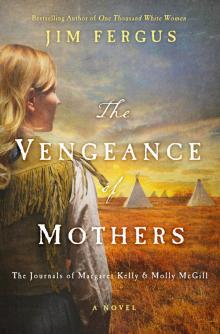 La Vengeance des mères
La Vengeance des mères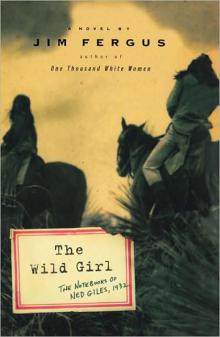 The Wild Girl: The Notebooks of Ned Giles, 1932
The Wild Girl: The Notebooks of Ned Giles, 1932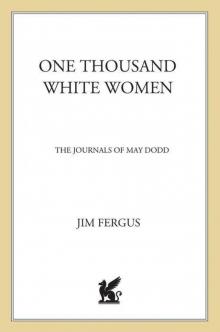 One Thousand White Women
One Thousand White Women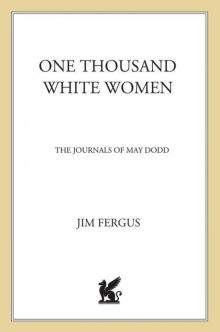 One Thousand White Women: The Journals of May Dodd
One Thousand White Women: The Journals of May Dodd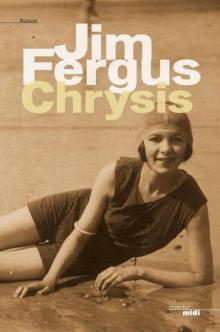 Chrysis
Chrysis Strongheart: The Lost Journals of May Dodd and Molly McGill
Strongheart: The Lost Journals of May Dodd and Molly McGill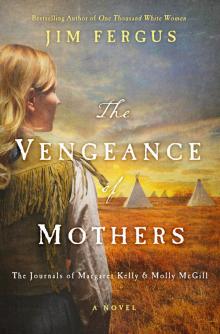 The Vengeance of Mothers
The Vengeance of Mothers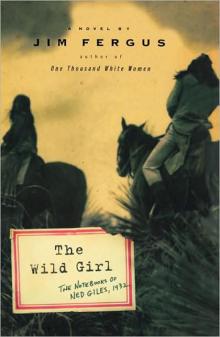 The Wild Girl
The Wild Girl